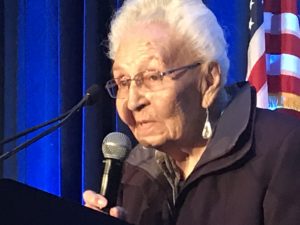
- Details
- By Levi Rickert
Indian Country is mourning the loss of decorated World War II veteran and former Cheyenne River Sioux Tribe tribal councilor Marcella Rose LeBeau, who was inducted into the National Native American Hall of Fame on November 6, 2021 during a ceremony she attended in Oklahoma City. LeBeau passed away on Sunday in Eagle Butte, South Dakota after a brief illness. She was 102.
Her passing was announced by her family on social media:
“It is with tremendous sadness that the Tiošpaye (family) of our beloved Lakota Matriarch Marcella Rose Ryan LeBeau Wígmuŋke Wašté Wín (Pretty Rainbow Woman) of the Cheyenne River Oóhenuŋpa (Two Kettle) Lakota Nation, regret to inform you that she has begun her journey to the star nation to be greeted by our ancestors on the evening of November 21st, 2021.”
Want more Native News? Get the free daily newsletter today.
Born in Promise, South Dakota, her grandmother gave her Native name: Wigmunke’ Waste Win’, which means Pretty Rainbow Woman. She became a nurse in 1942 and one year later, LaBeau enlisted in the Army Nurse Corp, and served as a combat nurse during World War II.
She provided medical care for soldiers injured during the Battle of the Bulge in Normandy, France on D-Day. For her heroic service, LeBeau was honored by the country of France with its highest honor, the French Legion of Honor Medal.
Upon receiving an award from the National Congress of American Indians (NCAI) during its winter session in Washington, D.C. in February 2020, Lebeau told a moving story of having treated a soldier, a tribal citizen of the Rosebud Sioux Tribe, who lost both of his legs during the war, and then meeting him some forty years later. He told her then he never forgot the care she provided for him and help restore his will to live.
After World War II, LeBeau returned home to the Cheyenne River Sioux and worked as a nurse and other positions for the Indian Health Service.
LeBeau served on the Cheyenne River Sioux Tribal Council from 1991 to 1995.
Even at 100, Lebeau was still working to have the medals of honor rescinded of those U.S. Calvary servicemen who participated in the 1890 Wounded Knee Massacre that left close to 300 Lakota men, women and children dead. She was instrumental in getting the Remove the Stain Act introduced in Congress
“My condolences go to the LeBeau family. They lost a loving caring monarch, I lost a true friend, the tribe lost a warrior and the world lost a true hero. I am sorry we could not remove those Medals of Honor awarded for the Wounded Knee Massacre during her lifetime, but we will continue to seek justice in her honor,” O.J. Seamon (Rosebud Sioux), founder of Four Directions Native Vote, said to Native News Online.
For A. Gay Kingman, executive director of the Great Plains Tribal Chairmen’s Association, LeBeau was a living legend, who was a personal friend and mentor.
“Even at 102, Marcella remained involved, dedicated and a humble Warrior. Her last Mission was to get the Medals rescinded from the Massacre of Wounded Knee. She worked with members of Congress to get legislation introduced, titled, ‘Remove the Stain Act.’ Now, we redouble our efforts to get the Legislation passed to complete her last mission,” Kingman said.
LeBeau earned praise and accolades beyond Indian Country. As part of the commemoration of the 19th Amendment’s 100th anniversary, USA Today named her one of the most influential women of the century.
On November 6, 2021, LeBeau was inducted into the Native American Hall of Fame for contributions “to the health and well-being of Lakota people, World War II soldiers, and diverse populations of people.”
The NCAI posted the following post to its Facebook page after LaBeau’s passing:
“NCAI mourns the loss of Marcella LeBeau, or Wignuke Waste Win (Pretty Rainbow Woman). As a distinguished World War II veteran and nurse, she has left a legacy that will live in the hearts and minds of #IndianCountry forever.”
More Stories Like This
Native News Weekly (August 25, 2024): D.C. BriefsUS Presidents in Their Own Words Concerning American Indians
Native News Weekly (December 14, 2025): D.C. Briefs
Wounded Knee Massacre Site Protection Bill Passes Congress
Two Murdered on Colville Indian Reservation
Help us defend tribal sovereignty.
At Native News Online, our mission is rooted in telling the stories that strengthen sovereignty and uplift Indigenous voices — not just at year’s end, but every single day.
Because of your generosity last year, we were able to keep our reporters on the ground in tribal communities, at national gatherings and in the halls of Congress — covering the issues that matter most to Indian Country: sovereignty, culture, education, health and economic opportunity.
That support sustained us through a tough year in 2025. Now, as we look to the year ahead, we need your help right now to ensure warrior journalism remains strong — reporting that defends tribal sovereignty, amplifies Native truth, and holds power accountable.
 The stakes couldn't be higher. Your support keeps Native voices heard, Native stories told and Native sovereignty defended.
The stakes couldn't be higher. Your support keeps Native voices heard, Native stories told and Native sovereignty defended.
Stand with Warrior Journalism today.
Levi Rickert (Potawatomi), Editor & Publisher

